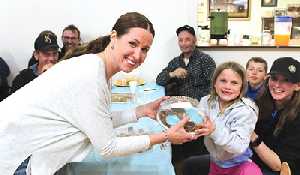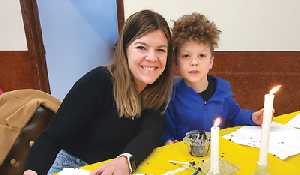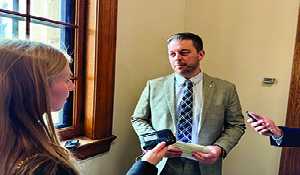Paige Hutchinson raising money for Malawi trip
February 16, 2018, 10:25 am
Kevin Weedmark


It’s a long way from the Saskatchewan Prairies to Malwai in southern Africa, but Paige Hutchinson, who grew up in the Moosomin-Rocanville area is heading to Malawi later this year as part of her studies at Lethbridge University.
Hutchinson grew up on a farm between Moosomin and Rocanville and was involved with projects such as Feed The Children. “We would do fundraisers to raise money for families in Africa or India and they always had trips where you could go to those places. I kind of looked into it then and had thought about doing a volunteer trip, but never did,” she says.
Now that she is studying anthropology at Lethbridge University, she has the opportunity to take a trip to help make a difference in a developing country.
“The Malawi Field Study is a field study trip to Malawi, Africa that they do every two years,” explains Hutchinson.
“I had heard about the trip last year at a talk. One of the girls that had gone before came to speak with us and tell us about it and I immediately fell in love with the idea. I was like ‘this is amazing. I want to be a part of this.’ ”
The trip is also a university class.
“This trip is actually a public health/finance class so this will actually go towards my degree and is part of my education,” said Hutchinson. “It is definitely a very practical and hands-on sort of education. There is a group of 15 of us. It is all girls on our trip.”
The group will head to Africa in May.
“We fly out May 7 and get there May 9 and I will be there for 28 days. We will be in the southeast part of Malawi. We will be traveling around to rural communities and towns, going from school to school.”
What will the group be doing in Malawi?
“Malawi borders a very large lake. It is one of the world’s largest lakes and because of that they have so many mosquitos, and with that comes malaria, which is a preventable and treatable disease. But with so many people living in poverty they don’t have access and knowledge of the medication and they don’t know how to prevent it or have the means to prevent it.
“We will be going from school to school in the little communities and will be working with the kids to teach them about malaria. But the really cool thing is that since we can’t speak Chichewa, which is what they speak, we have to use our bodies in theatre and action, so that is where the fine arts comes in. We will be doing lots of songs and dances—interpretive drama and interpretive dance with them. We will have to be pretty creative and use our thinking caps. There probably will be a few mosquitos that we will be acting out and things like that.”
The area the group is heading to is one of the more undeveloped parts of Africa.
“Where we’re going to be it is a very much underdeveloped area,” says Hutchinson. “Lots of the people we will be working with will be living in huts where they have to get water from a well.”
In addition, the students will work with health care providers in the area.
“We will be setting up clinics working with the health care providers there and set up HIV clinics where people can come and get tested. We will be taking names and helping run these clinics. Also on our trip there is a lot of nurses, so anybody that is in nursing is going to bring their stethoscope and they will be taking heart rate and blood pressure and things like that.”
There is also an academic side to the trip.
“The academic portion of it is before we leave we have nine days in class where we will be learning about the culture, the people, the public health side of it and also the fine arts side of it, the drama side, which is really interesting to me. Then while we’re there we will be picking a topic to study. We will be making journal entries, breaking down what we have observed and what we’ve learned and taken away from it. There are a wide variety of topics—anything we want to research. I’m thinking I’ll take a cultural stance on it and look at their culture and how to relate that to my anthropology degree.”
The students have received some briefings on Malawi.
“We have two professors who have done the trip five or six times and they have told us all about it, what to expect, what to wear, what not to wear, what to bring, what we will be eating, just giving the background on it. They have been a big help. It is definitely going to be a pretty big experience and there are lots of things that come with it, like we’ve taken care of personal directives and the insurance part of it. There are definitely a lot of things to consider when travelling over seas especially to a place like Africa.”
What kind of place is Malawi?
“I’ve heard two sides of it. I’ve heard from some people there is high crime and people will steal things and you have to watch out for that. I’ve also heard from people who have been there before that you can leave your backpack on the street and no one would touch it and that people are very kind and generous. There was a story from one of the trips to Malawi that someone had lost a camera and someone had stole it because they wanted this camera because it could get them some money, and so they just approached the group of people and they said ‘someone has stolen this, if you have taken it just please return it.’ And I think the person felt so guilty they returned it right away. I heard it is a very peaceful, welcoming country from the people that have been there. I have heard very good things about the people and the place.”
What is Hutchinson doing to prepare herself for the trip?
“I’m totally obsessed right now with Africa in general and Malawi and I’ve been googling lots of things about it. They eat lots of fish, that is one their staple foods, and I have also been learning Chichewa which is a very hard language. So some of the girls on our trip have made flash cards and things like that. Others have been studying up on it. I definitely have been googling lots of things to see what the place looks like—the culture side of it, the religion and the food and things like that.
“I think I’m going to experience culture shock—I’ve never travelled anywhere overseas. I’m aware that this is going to be a lot different from our lifestyle. It is going to be hard to see kids who don’t have very much or kids that may not have opportunities or may be struggling with disabilities and they don’t have access to education or health care.”
What is she hoping to learn from the trip?
“I’m really hoping to learn how to make a difference and how to be understanding of other cultures,” says Hutchinson. “I think I’m going to learn and have my eyes opened. I’m really hoping to learn about the access they have, whether it be education or health care. There are other projects that go on there too. One is called the Malawi Water Project and I’m really hoping that I run into some people that are doing that project and learn about their sustainability and access to water. I also want to learn more about malaria and what people there are experiencing.
“We will be raising money for the mosquito nets that we will be handing out to the pregnant mothers and families and people that are at risk of getting malaria. It is a treated insecticide net that they put over their bed at night or whenever they are in their home. I’m just wanting to learn more about what people go through when they do have malaria and what access they have to health care.
“For us, if we were to get malaria we would go to the hospital and deal with it there and be given pills and for the most part be okay. Whereas there, the children that are at high risk and pregnant mothers that are more vulnerable can’t beat a disease like malaria. Thousands of people in Africa, Malawi specifically, die because of malaria every year.”
Hutchinson is putting her fundraising focus on mosquito nets because she has already covered the cost of her trip.
“There are lots of things that we have been collecting and fundraising for. The first thing that I did was fundraise for my trip and I’ve had amazing generous people—friends, coworkers, family—that have donated towards my trip cost. I also received a scholarship from the university to go on this trip and I am so grateful. My trip is basically covered and that is really amazing. Because my trip is covered, I took the initiative to raise money for the mosquito nets—that is the biggest thing we are fundraising for. We have also been collecting soccer balls to take over, and school supplies to hand out while we’re in Africa. But the main portion of our fundraising is for the mosquito nets. The fundraising we are doing in Lethbridge and the fundraiser I’m holding back home is all going directly the mosquito nets.”
Hutchinson is planning a fundraiser for Rocanville for Friday, February 23. How did the idea come up for the fundraiser in Rocanville?
“My grandma, Marilyn Paul, suggested I do a tea fundraiser, so I was like ‘perfect, you have obviously done teas before.’ I wish I was in Rocanville doing all my fundraising because I cannot express how generous people in Moosomin and Rocanville have been towards my trip. I’ve had people donate towards my trip, mosquito nets, towards the tea. I’m thinking it is going to be a huge success, and everyone back home is so generous and understanding and wants to help.
“I think sometimes there is not always that outlet to help. I think that is also why so many people are willing to help out, because they know me and they know I’m going to go there and definitely have an amazing experience and make a difference. So I think it is going to be such a success doing it in Rocanville but also with Moosomin people going to the event.”
Hutchinson is hoping for a good turnout.
“We are aiming for about 75 people. We also have a crowdfunding page set up. Anyone can google Malawi Field Study 2018 Crowd Funding (https://secure.e2rm.com/registrant/EventHome.aspx?eventid=234149&langpref=en-CA#&panel1-2) and it should be the first link that comes up and it has information on how to donate. Anyone who donates will get a tax receipt. The really nice thing about that website is 100 per cent of that money that people donate goes towards the mosquito nets, whereas with other pages like gofundme, they take a percentage of it. One mosquito net is $15. That is a way to judge how far your donation is going.”
Hutchinson says she is not nervous about the trip at all. “I’ve always wanted to do something like this and there is not too much that scares me,” she says. “I’m really looking forward to it. I thinking it will definitely be an eye opener and a bit of a game changer that might help me decide where I want to go in life and what my passion is.”



































